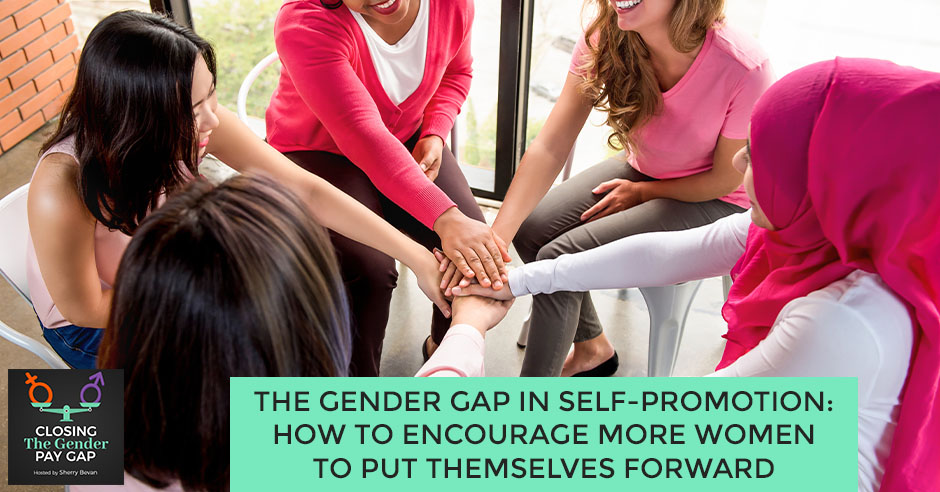Certain companies have half their workforce female, but there are very few women in leadership positions. Why does this keep happening, even today? Sherry Bevan explores the gender gap in self-promotion. A self-promotion is an essential tool for career advancement. Women have to realize that they are valuable and worth it. In this episode, Sherry explains why women don’t put themselves forward for promotion and shares ideas and how you can address this issue in your organization. It’s not just about fixing women; it’s also about changing the system and the landscape. How do you do that? If you want to learn what you can do to encourage women to self-promote, then this episode is for you.
—
Listen to the podcast here:
The Gender Gap In Self-Promotion: How To Encourage More Women To Put Themselves Forward
Thank you so much for joining me. I would love you to come back next episode and to make that easier, you just needed to subscribe to the show. I remember when I was at school, I was jealous of the kids that had birthdays during term time. At the same time, I was also secretly glad for having a birthday in August meant I never had to endure the birthday bumps because it was always the school holidays. I don’t know if the birthday bump is a thing anymore.

I’m also busy finalizing invitations for my executive round table on the impact of hybrid working on the gender pay gap in the technology sector. I still do have a couple of spaces available for the executive round table on the 5th of October. Please do reach out if you’d like to join us, to share insights, experiences and learnings with participants from other tech companies, including Sky, Microsoft and Sage. In this episode, I want to explore why women don’t put themselves forward for promotion at work. What can you do to change this habit?
Self-promotion is an essential tool for career advancement whether that’s in job, performance reviews or just simply networking. Women often feel they need to be more than capable of doing the job at that next level before they apply. To the issue of self-promotion, it’s less likely to be a problem early on in careers, where there are more structured programs for career progression. It means it’s more likely to be of a challenge further down the talent pipeline, particularly when you’re recruiting for more senior roles or promoting into those more senior roles. For some women, those more senior roles come at a time when they’ve taken time out for maternity leave and often that can have a knock on a woman’s confidence.
The gender gap in self-promotion reflects an underlying gender gap in how individuals subjectively evaluate their performance.
According to a Hewlett Packard study, men will apply for a job when they meet only 60% of the qualifications but women apply only if they meet 100% of them. The main reason that women give to not apply for a job is they’re concerned that they’d be wasting their time if they’re not fully qualified for the role. Men tend to have no such qualms about applying for jobs even if they don’t quite fit the criteria.
Whenever I talk about women, men, I’m talking about general tendencies. There’s a great paper I’d encourage you to read. It’s called The Gender Pay Gap in Self-Promotion. It was first published back in October 2019 and has been revised in May 2021. It’s by Christine Exley and Judd Kessler. It shows that women subjectively describe their ability and performance to potential employers less favorably than equally performing men, even when all incentives to promote are removed. However, the gender gap remains. The gender gap in self-promotion is reflective of an underlying gender gap in how individuals subjectively evaluate their own performance.
In this working paper from the National Bureau of Economic Research, women were consistently rating their performance on a particular task lower than the men did. Even though when you look at the actual test results, both groups had the same average score. When it came to self-assessment, men, on average, gave themselves 61 out of 100. Women gave themselves 46 out of 100. Even when told that an employer would use their self-evaluation, decide whether to hide them and what to pay them, women still self-promoted less than men.

At various points in our professional lives, individuals are explicitly asked about their performance and their ability especially when it comes to applying for a job, a self-nomination for promotion. Even to simply being more visible and expressing articulating skills, experience and ambition. This paper then documents, firstly, a gender gap in self-promotion in that women subjectively describe their performance less favorably to potential employers than equally performing men but it also documents a gender gap and informed self-promotion. The gender gap persists even when participants know that absolute and their relative performance and they are asked about that performance.
This relates to an underlying gender gap in how men and women subjectively evaluate their performance but it’s not simply enough to encourage or educate women on how to be more confident or how to be more assertive. It’s not just about fixing women but it’s about changing the system and changing the landscape. What’s the answer? Do we need to use more objective performance metrics rather than subjective self-assessments of performance?
Even then, we’ve seen from a previous episode that there is bias in that performance and the feedback. We’ve already seen that men are more likely to put themselves forward for a role, even if they’re not ready in terms of ticking all the boxes or ticking all the criteria, whereas women often feel they need to be more than capable of doing a job before they apply. Many business leaders support go for the job and worry about if you can do it later.
Education is a key way of encouraging women to think about visibility rather than self-promotion.
This doesn’t necessarily come naturally to all women and it doesn’t come naturally to some men as well. Women tend to overvalue expertise and want to be experts at everything to be able to move up the career ladder. When in fact, the higher up the ladder you are, the more you’re focused on strategy and the importance of delegation. Women tend to have a reluctance to claim achievements about being assertive to talk about their achievements and results. The double whammy of this is that women tend to get penalized for seeming assertive because it’s not our cultural expectation. It’s not what society wants and expects from women.
Women tend to fall into the habit of expecting others to notice the results and offer the rewards. This comes back to our school days where we learn that we work hard and therefore we get good results in terms of our exam results, our degree. When we get into the workplace, working hard and producing good results is not enough. We also see women in the loyalty trap where they get more focused on their team, their manager or their company rather than prioritizing their own career. They’re not always on the lookout for opportunities and they tend to not think of the job as a stepping stone.
They feel uncomfortable admitting self-interest and another interesting thing is that women tend to be risk-averse, which means they’re less open to failure and therefore perhaps less likely to take a chance to take the risk of going for that promotion or go for that new job. Women tend to be much more detail-focused. They tend to want to be perfectionists and to focus on the detail and that means they’re unable to delegate as effectively, which often then keeps them overwhelmingly busy.
Attending meetings, we tend to see women minimizing themselves, making themselves smaller, taking up less space in meetings and that has a subtle subconscious effect, not just on the woman but on the people around her and of expectations of her. The idea of self-promotion itself feels very alien to many women. It goes against that be nice behavior that has been instilled in women and girls from very early years because self-promotion conjures up this idea of ego. It conjures up this idea of the falseness of awkward actions. Often for women, it feels too masculine, particularly if they’re actively trying to be their authentic feminine self and not a replica of the masculine career go-getter.
We’ve looked then why women tend to not put themselves forward for promotion, why they don’t self-promote. To knowing all of this, what can you do to encourage more women? What can organizations do to encourage more women to put themselves forward for promotion? Education is a key way of encouraging women to think about visibility rather than self-promotion. Education in the form of lunch and learns, workshops or leadership programs, either in-house or sending women to an external program. Something that a large technology company started to do because they were noticing that fewer women were putting themselves forward for promotion in that annual promotion mound each year.
In the run-up to the annual promotion round, they started to send out emails, informing people where the information in the data on how many employees had self-nominated the year before and of those, how many had been successful and showing the percentages for those identifying as men or as women. They would then send out a couple more emails before the promotion round closed of how many had submitted or self-nominated in that particular promotion round.
What they found was this encouraged more women to put themselves forward because they could see the imbalance and they could see the injustice. They did this for 3 or 4 years and then one year, they didn’t send out those pre-promotion emails and what they noticed was that the numbers dropped right back again. Something else you can do is to look at the language of your promotion criteria in the same way as you would approach looking at neutral language on job descriptions for job applications.

If you’re not sure how to do this, the first step is to focus on any gender-coded words, for example, workmanship, chairman, grandfather clause. Look at the descriptive language because there are some words that are more appealing to women, what we call feminine-coded language. For example, feminine-coded language that appeals to women are things like collaboration, communication or connection. A few examples of masculine-coded language would be aggressive, competitive, decisive.
What we’ve seen from the research is whereas feminine-coded language doesn’t particularly put men off, masculine-coded language definitely does put women off. Something that you can do is to look at your criteria and see whether you can change the language to encourage more women to put themselves forward. More than that, when you review the criteria, the other thing to look at is are the requirements that you have written down necessary?
This goes back to the fact we were discussing earlier that women will typically only put themselves forward for a job, a promotion or a new role when they meet 100% of the criteria. Review your criteria. Review the requirements for your promotions. Are they strictly necessary? One large financial institution noticed a few years ago is that its male assistant bank managers tended to put themselves forward for promotion to branch manager a year before they were ready and women tend to do it a year after they were ready so a year too late.
What they started to do then was to proactively promote their women a year ahead of the time. The other thing that they started to realize is that when women were ready or when women felt they were ready, this often coincided with the time that women were starting to think about or starting families. This meant that they didn’t want to put themselves forward for a bigger role for a promotion because they were unsure about their career, their life and how they would feel about having that bigger role with a family to take into consideration.
What this bank started to do was to promote women before they had children. Perhaps potentially a year earlier than they were ready for it but it meant that once you’ve got that promotion and then you start to think about having a family, you just adapt. You take on the new role, you take on the new responsibilities and then when you come back from maternity leave, it fits into your life a lot more easily.
I would encourage you to look at, gather and analyze the relevant data. Analyze their promotions and look at which departments or teams provide more of your senior staff. Let’s put a supermarket, for example. In a supermarket, you make your way up the career ladder. You become responsible for a particular section so you become a section manager for frozen goods store, household cleaning or the bakery department.
One national supermarket realized that most of their store managers came from 1 or 2 sections and these were the sections that not many women worked in. By gathering and analyzing their data and seeing where their promotion, where their senior staff came from, that allowed the supermarket to take action for the future.
In this episode, we’ve looked at why women don’t put themselves forward for promotion and we’ve looked at a few ideas and how you can address this issue in your own organization. If you’d like to explore some of the ideas discussed then please do reach out and book a call with me. I offer exploratory calls. You can ask any questions you’ve got about the work I do with technology companies on attracting, developing and retaining your female talent so you close the gender pay gap.
Thank you so much for reading. I’ve enjoyed writing about why women don’t put themselves forward for promotion and what you can do in your organization to change that habit so that you start to close the gender pay gap. I hope you’ve enjoyed reading this episode and gain some valuable insights. To find out more about me and my work, visit SherryBevan.co.uk. Thanks for reading.
Important Links:

